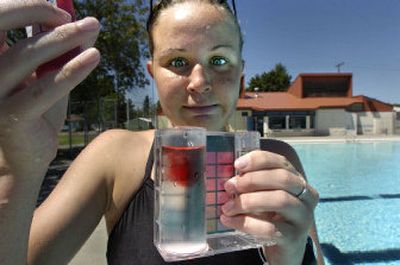Managers do back flips to keep the pools open

On a warm summer day last year, a father gave his son a 40-ounce Slurpee just before they jumped into the Hillyard Pool.
Soon after, the father was playfully throwing the 5-year-old in the air when lifeguard Tyler Bowman walked over to the pair to warn them that tossing kids is prohibited in city pools.
“Then,” Bowman said, “the kid looks at me, and …” the bright red cherry Slurpee came back up – drenching Bowman and splattering into the pool.
Managers were summoned, whistles blew, and everybody was out. A quickly expanding red cloud spread throughout the water, forcing workers to pump the pool with extra chlorine and let it cycle through heavy-duty filters before they could reopen.
Such accidents are common at public access pools throughout Spokane.
Public pools must keep chemicals carefully balanced, follow a list of county and state safety regulations, and maintain accurate records, or face closure.
Washington state law contains nearly 70 pages of detailed specifications for the construction and maintenance of pools, with rules ranging from the width of fences to the proper pH level. Public pools – including those in hotels, gyms and apartments – must receive permits, and maintain their pools daily. Enforcing those laws is the responsibility of county health boards.
Inspectors with the Spokane Regional Health District watch all public pools in both the city and Spokane County. During unannounced checks, inspectors look for an improper balance of chemicals, broken barriers around the pool and a functioning drain system – among many other items, said Steve Main, the aquatics technical adviser for the health district.
If inspectors find a critical violation, such as poor disinfectant levels or a broken drain cover, they may close the pool until the problems are fixed, Main said. Lesser violations will permit the owner to get two more inspections within 40 days to fix the problem before the pool is closed.
If citizens lodge a complaint with health officials, inspectors will go to the pool to investigate, Main said.
Though the county keeps records of violations, officials said they were unable to provide an estimate of the number of pool closures or how many critical violations have been recorded. The health district said records are not computerized and it would take more than a month to gather the information by hand.
Public pool owners are required to test their water at least once a day and record the levels in a log, and then adjust the chemical levels throughout the day. What was once a tedious process is now easier thanks to automation, said Ted Puryear of Pool World, who has worked with pools for 17 years.
“Automation is one of the greatest things that has ever come out for pools,” Puryear said. When pools have fluctuating numbers of people getting in and out, the chlorine levels often need adjustment, which is difficult to do manually. With newer systems, a computer releases just enough of the chemical to keep the water in balance.
Every pool Puryear has installed in the last six years has used automation, he said.
City pools are older and do not have computerized chemical systems, so the manager of each pool tests the water every hour to ensure a proper balance of chemicals, said Sarah Ranson, the aquatics supervisor for Spokane Parks and Recreation.
The appearance of either vomit or stool in the water mandates an instant pool closure. Solid feces means closure for a few hours, but diarrhea or vomit will close a pool overnight while filters work overtime and superchlorination cleans the bacteria, she said.
“Managers are taught to be on top of things every second of the day,” she said. “We test more than the regulations just to show that we’re being proactive.”
At the Hillyard pool, manager Tiffany Seefeldt checks the water and adjusts the chemicals from a booth at the side of the pool. She said she is surprised the pool hasn’t closed down yet this year, though last year when she worked at Comstock Pool she had one week where the pool was closed every day.
Because the pool season is relatively short in Spokane, operators need to be educated about how to maintain pools, Puryear said. Though the risk for contracting illness in pools is relatively low and Spokane has not seen a major outbreak of sickness due to unclean water, pool owners must remain vigilant.
“Down in the Southern states, pools are a part of everyday life,” he said. “We need to take that same mentality.”